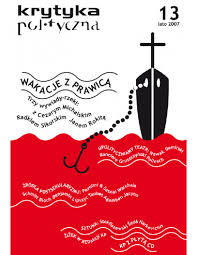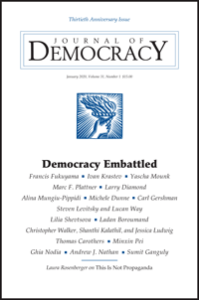 After weeks of watching massive peaceful demonstrations against neighboring Belarus’s authoritarian regime, Poles have finally taken to the streets to confront their own illiberal government, says Sławomir Sierakowski, founder of the Krytyka Polityczna movement, and Director of the Institute for Advanced Study in Warsaw.
After weeks of watching massive peaceful demonstrations against neighboring Belarus’s authoritarian regime, Poles have finally taken to the streets to confront their own illiberal government, says Sławomir Sierakowski, founder of the Krytyka Polityczna movement, and Director of the Institute for Advanced Study in Warsaw.
Women in Poland may just have terminated the authoritarian rule of the nationalist party Law and Justice, which barely a few days ago seemed entrenched for decades to come, analyst Adam J Chmielewski writes for Open Democracy. The revolt was ignited by a ruling of Poland’s Constitutional Tribunal according to which abortion of a foetus with incurable or terminal defects is unconstitutional. The ruling satisfies the expectations of the Roman Catholic Church in Poland, which for decades has insistently sought a complete ban on abortions in Poland.
Poland is just one element in a global struggle where democracies face a challenge from internationally connected fundamentalist groups and authoritarian forces, said Klementyna Suchanow, one of the main organizers with the initiative Women’s Strike, the key force behind the protests. Whatever happens now in Poland will be crucial for democracy worldwide, claims Suchanow, the author of “This is War: Women, Fundamentalists, and the New Middle Ages,” a book on international ultra-conservative groups that want to ban all abortions.
 Kaczyński’s move to revive the anti-abortion law aims to boost the coalition, marginalise the Confederation and thank the church for its support is a ‘“populistainment” classic beloved of the PiS: light a fire, arouse strong emotions and make spectators choose sides, according to Journal of Democracy contributors Karolina Wigura and Jarosław Kuisz of the Polish weekly Kultura Liberalna. This time, however, the populist playbook isn’t quite working. A new political faultline has been created and Kaczyński can’t control the outcome or put the genie back in the bottle, they write for The Guardian:
Kaczyński’s move to revive the anti-abortion law aims to boost the coalition, marginalise the Confederation and thank the church for its support is a ‘“populistainment” classic beloved of the PiS: light a fire, arouse strong emotions and make spectators choose sides, according to Journal of Democracy contributors Karolina Wigura and Jarosław Kuisz of the Polish weekly Kultura Liberalna. This time, however, the populist playbook isn’t quite working. A new political faultline has been created and Kaczyński can’t control the outcome or put the genie back in the bottle, they write for The Guardian:
Almost 300 years ago, Montesquieu noted that while a despot is busy enslaving his subjects he may also be enslaving himself. This is the trap the embattled Kaczyński is falling into. As he deprives Polish citizens of their freedom of choice, he is becoming increasingly ensnared by the distorted political system he has himself created. And it could eventually consign him to the scrapheap of Polish history.
As in Belarus, Poland’s de facto ruler, Jarosław Kaczyński has overplayed his hand – and women have been the first to smack it away, former NED Reagan Fascell fellow Sierakowski writes for Project Syndicate:

Sławomir Sierakowski
As matters stand, it appears that Kaczyński has blundered badly. In a recent poll, 73% of respondents said they are against the Tribunal’s ruling (including 60% who are strongly opposed). Even the PiS base is divided, with 37% supporting the judgment and 36% opposing it. As a result, PiS’s support overall has fallen sharply for the first time since it came to power. In a Kantar poll published on October 28, the party had just 26% support, compared to 24% for Civic Coalition (an alliance between Civic Platform and Modern). All told, PiS and its allies have just half the support of parties opposed to PiS.
One thing is certain. Right-wing populist constitutionalism in Poland – defined as a descriptive approach to changing the role of the constitution – has nothing to do with popular constitutionalism, adds an associate professor at the Nicolaus Copernicus University. Criticism of PiS against the judicial review in Poland has been directed solely at the ‘former’ liberal juristocracy. Having been taken over, the Constitutional Tribunal has become a convenient tool for PiS to implement their policy while keeping their “hands clean”. The ongoing mass social protests against the judgment of the Constitutional Tribunal are, among others, a form of rebellion against this hypocrisy, she writes for VerfBlog.
Will Women Defeat Poland’s Illiberal Regime? by Sławomir Sierakowski @ProSyn https://t.co/4MijcPHo0L
— Democracy Digest (@demdigest) November 3, 2020







